Good Wednesday morning,
Prime Minister MARK CARNEY is in the Northwest Territories today.
Carney is en route to tomorrow’s meeting of the Inuit-Crown Partnership Committee tomorrow in Inuvik. The committee is a collection of top officials including the PM, the president of the Inuit Tapiriit Kanatami (currently NATAN OBED), and additional cabinet ministers and Inuit leaders, which meets regularly.
Carney suggested yesterday that the meeting will cover his major projects fast-track law. He said he would be meeting with Métis leaders too in the beginning of August, “to begin the process of setting out how we are going to cooperate.”
Today, Carney will hold a photo op with N.W.T. Premier R.J. SIMPSON in Fort Smith at 11:25 a.m. MDT. At 1:10 p.m., it’s another public photo op in the city, featuring Carney in talks with what his office has described as “local community leaders” about the season’s wildfires.
By 6 p.m., Carney will be in Inuvik, in the northwest corner of the territory, where he’ll tour a community centre with Obed and DUANE NINGAQSIQ SMITH, the CEO of the Inuvialuit Regional Corporation.
Premiers wrap Muskoka Summit
The premiers will finish up their three-day summit in Huntsville, Ont., today. They are expected to hold a closing news conference this afternoon.
Prime Minister Mark Carney met with the group yesterday, following an informal, first-ministerial shindig at Ontario Premier DOUG FORD’s cottage the night before.
Carney and Ford made opening remarks in front of the press before moving the remainder of their talks behind closed doors.
Mostly, the two spoke about DONALD TRUMP, U.S. tariffs, and how Canada would manage despite them. Here are a few highlights:
Carney
- Strengthening Canada’s economy will require “support for affected industries: lumber, steel, aluminum, [and] automobiles, particularly.”
- He continued as follows. Bonus points if you can figure out what he meant:
“Crucially, what we’re looking to do is support those industries to build bridges, to build a stronger Canadian economy, to build forward. So if it’s lumber, it’s building more houses in Canada. It’s developing new markets around the world, as we work with the Americans.”
- The new Major Projects Office should be up and running by Labour Day, to provide a “single point of contact for governments, proponents, and communities for proposals.”
- He said he will be in Inuvik, N.W.T., tomorrow for a meeting Carney said he will also meet with Métis leadership at the beginning of August,
Premier Ford followed Carney, and spent most of his time opining on the best way to fight Trump’s trade war.
Ford
- He called for Canada to start producing more finished metal products, including I-beams, rebar, and aluminum and tin cans, and to “start onshoring everything we possibly can.”
- He noted that Trump will “say one thing one day, and he’ll be out on Fox News or wherever changing everything. So, we need to stay united”.
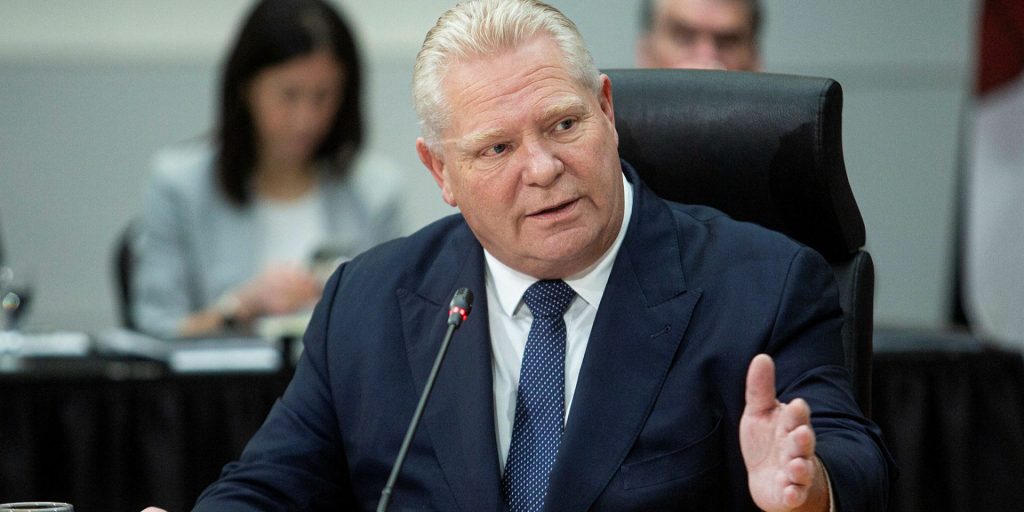
- He gave examples of key Canadian exports to the U.S.—oil, potash, nickel, aluminum— and said Canada should make sure Trump understands that Canada is the U.S.’ “best customer.”
- He said Canada should “match tariff for tariff, dollar for dollar, and hit ‘em back as hard as we possibly can.”
- He continued: “There’s one thing that President Trump understands, is strength. He doesn’t understand or appreciate weakness. He will roll over us like a cement roller if we show an ounce of weakness with the president, in my opinion.”
- He finished with a thinly-veiled shot at former prime minister JUSTIN TRUDEAU, saying it was “refreshing to some of us that have been around this table for some time to have a prime minister that has our backs.”
That wasn’t all, though. B.C. Premier DAVID EBY lobbied Carney for bail reform, the Toronto Star reported. Carney has already committed to tightening and toughening the criminal bail system via his election platform.
The Star also reported that the premiers had brought in GARY DOER and DAVID MACNAUGHTON, both former Canadian ambassadors to the U.S., to advise them on strategy.
The group also discussed the impact of the wildfires raging across the country, and the PM committed to providing help as needed, according to a press release from the PMO.
The premiers issued a (much longer) statement of their own at the end of the day. You can read it here. Among other things, it included calls for federal cash for infrastructure, housing, and climate change adaptation.
Premiers agreed to meeting with Indigenous leaders, says AFN chief
Canada’s premiers met Indigenous leaders in Huntsville on Monday to hear their concerns with Carney’s major projects law, and about a lack of basic resources in Indigenous communities.
The national chief of the Assembly of First Nations, CINDY WOODHOUSE NEPINAK, told Politics This Morning yesterday that she told the premiers that closing the “First Nations infrastructure gap” must be included as a “national priority and a project of national interest.”
The gap referred to by the chief here includes a lack of adequate housing, education, clean water, and internet services, among other things.
A previous report by the AFN and the Conference Board of Canada stated that it might take around $349-billion to close this gap.
The need for tailored policing for Indigenous communities, and passing previously-proposed legislation on clean water on First Nations were the other points the chief highlighted in her meeting, she said.
She said she called on the premiers to hold a separate joint meeting with First Nations in the coming weeks, after they were excluded from yesterday’s meeting. Woodhouse Nepinak said the premiers agreed.
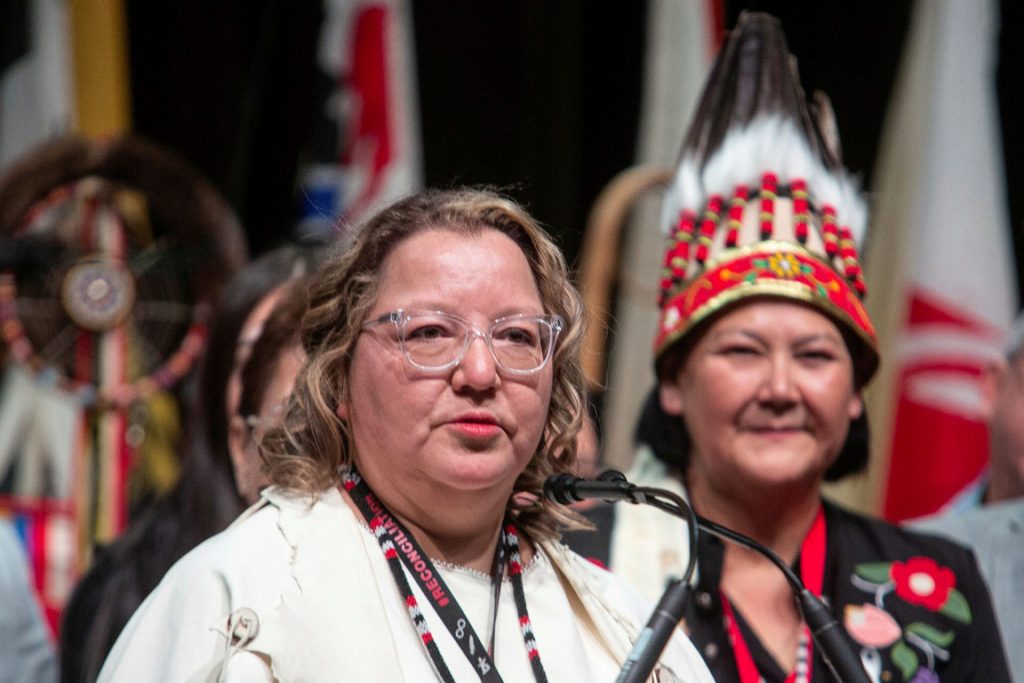
“We also talked about how we are a family, and we are in a marriage in this country with the federal government,” she added. “Nobody is leaving the house and there’s no divorce. So, we have to figure out how to make it work.”
Yesterday, Ontario Premier Doug Ford said his government wants to “work together” with Indigenous leaders in advancing mining and infrastructure projects. Global News has more on it here.
Woodhouse Nepinak also met Prime Minister Mark Carney with other Indigenous leaders on July 17. Members of that group shared frustrations over the passing of federal Bill C-5, the major projects law.
While there were mixed reactions on the outcome of that gathering, Woodhouse Nepinak said it was a good first step, and they are going to continue the dialogue. First Nations have made submissions to the federal government over the last week to this end.
In their upcoming annual general assembly in September, the chiefs will pass a resolution “one way or the other” on Bill C-5, Woodhouse Nepinak added.
The federal government has pledged to set up an Indigenous Advisory Council that will work closely with the Major Projects Office to gather consensus from First Nations, Inuit and Métis communities.
Nepinak expressed doubts about the council, and questioned if it will be hearing the voices of the First Nations who will be impacted by the projects at the grassroots level.
“What we’ve seen from past councils is that they report to the federal government, they don’t report back to First Nations people. And is this going to be another one of those? I don’t know,” she said.
“Lots of questions still to be asked. And we’ve sent those in a letter to the PM.”
In the news
Kovaliv departs: Ukrainian Ambassador YULIYA KOVALIV is returning home after three years posted in Canada. CHRISTINA LEADLAY gathered reaction in her Heard on the Hill column.
G7 Speakers coming to Ottawa: House Speaker FRANCIS SCARPALEGGIA is hosting a meeting of his G7 peers in Ottawa in September. NEIL MOSS has that story.
Trade deadline: An Aug. 1 deadline for Canada-U.S. trade talks could arrive before a U.S. ruling on the legality of Donald Trump’s tariffs. Neil Moss reports.
Notwithstanding pause: LAURA RYCKEWAERT speaks to Senator PETER HARDER about his bill proposing to restrict future uses of the Charter of Rights and Freedoms’ “notwithstanding” clause.
What’s the rest of the cabinet up to?
At 9 a.m., Foreign Minister ANITA ANAND is meeting with envoys from South Korea in Ottawa.
They include the country’s “presidential special envoy” to Canada, KIM BYUNG JOO, as well as national assembly members KIM JU-YOUNG and MAENG SUNG-KYU. The talks will focus on “energy security, critical minerals and defence cooperation,” as well as other shared priorities, according to Global Affairs Canada.
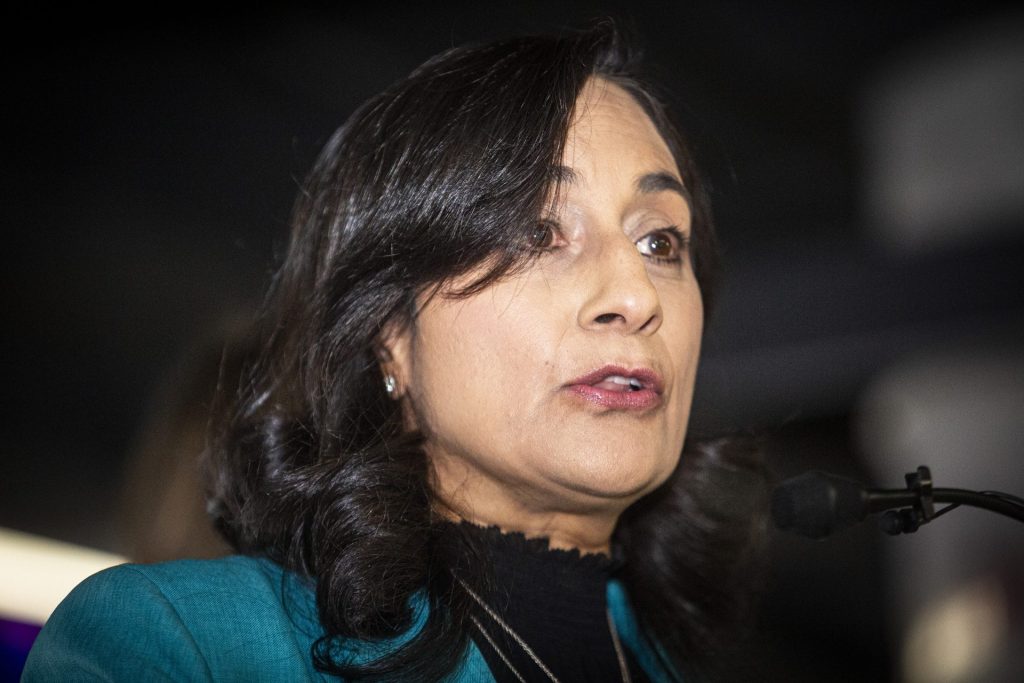
South Korea is hosting an APEC forum in October.
The primary purpose of Kim’s visit may be to sell Korean submarines to Canada, according to a report by the Korea Times.
Kim is a former general-turned-politician, and a member of the governing Democratic Party.
Canada’s government is planning to spend tens of billions to purchase up to 12 new submarines for the Navy. South Korean shipbuilder Hanwha Ocean is gunning for the contract.
What else is happening today?
At group of girls and young women are coming to the Sir John A. Macdonald Building today for a “leadership forum” organized by the group Elevate International.
“Through keynote speeches, youth-led panels, leadership workshops, and meaningful connection, girls are continually equipped with the tools, role models, and confidence to lead boldly—in their communities and on the world stage,” reads a promo for the event.
Open letter inbox
Conservative Leader PIERRE POILIEVRE sent an open letter to the government yesterday demanding that it take action to block the Longest Ballot Committee protest movement from running candidates in elections.
Poilievre addressed the letter to STEVEN MACKINNON, the government’s House leader. Mark Carney’s cabinet does not include a minister of democratic institutions.
The Longest Ballot Committee is running more than 100 candidates in the upcoming Battle River-Crowfoot byelection, in which Poilievre is running to regain a seat in the House. The protest group also ran numerous candidates in Poilievre’s riding in the general election.
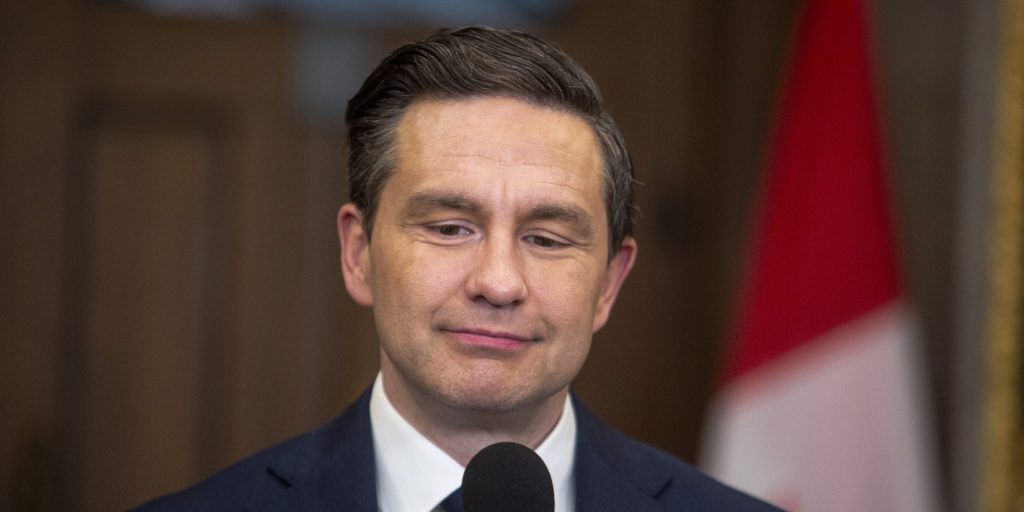
In statements, representatives of the Longest Ballot Committee have said their goal is to force a change to Canada’s electoral system.
Poilievre specifically called for the government to require at least 0.5 per cent of the population of a given riding to sign nomination papers for any candidate before they can be approved to run for office, to disqualify signatures from individuals who have already endorsed another candidate in the same election, and to prevent official agents from representing more than one election candidate at a time.
Conservative MP MICHAEL COOPER co-signed the letter. He is the critic for democratic institutions.
The effect of the Longest Ballot protest has been to stretch out the ballot-counting process. Candidates running as part of the protest have received very few votes, and so far have not meaningfully changed the outcome of any given election.
People
Global News is temporarily getting a new bureau chief. MERCEDES STEPHENSON is taking parental leave from that job, and veteran correspondent DAVID AKIN is filling in. Akin posted about it yesterday.
Today’s data
Statistics Canada is releasing a new batch of in-depth economic and social reports this morning.
Today’s reports will cover technology adoption among businesses, Canada’s retention of STEM grads, recent trends in immigration from Canada to the U.S., and socioeconomic characteristics of workers in fields dependent on trade with the U.S., among other topics.
Statistics Canada is also releasing new reports on international travel, home prices, and fossil fuels this morning. You’ll be able to find it all here beginning at 8:30 a.m.
Yesterday, StatsCan published a new visualization of speakers of Indigenous languages. It also published figures for police-reported crime in 2024. Overall, crime in Canada decreased slightly, after three consecutive years of increases. The decrease was mostly due to a decrease in non-violent crime.
In case you missed it
Feds sell off Rimouski armoury
The federal government has sold off a historic building in Rimouski, Que., to be converted into student housing.
The Rimouski armoury has been sitting vacant since 2005, according to a joint press release announcing the sale by Procurement Minister JOËL LIGHTBOUND and Defence Minister DAVID MCGUINTY.
The block-like, red-brick building was constructed in 1910-11. It once served as the headquarters of the Fusiliers du Saint-Laurent, an infantry reserve regiment.
The government has sold the building to Immeubles Must Urbain Inc., which is planning to convert it into student housing, according to the press release.
The government is in the process of identifying surplus federal properties to be sold for housing development, and listing them in the public “land bank”, which you can find here.
The land bank includes several Ottawa properties as well. Most prominent among them, large office and retail buildings at 171-181 Bank Street, and 122 Bank Street.
Finance Canada launches consultation on insurance coverage for bank deposits
Finance Canada has announced plans to increase the insurance coverage limits for select bank deposits offered by financial institutions that are members of the Canada Deposit Insurance Corporation (CIDC).
CIDC is a federal Crown corporation that offers insurance on such deposits in the event the member bank/trust/loan companies go bust and cannot return all/some of the money. It currently has 84 such institutions under its umbrella, and finances the coverage out of the premiums paid by these entities. It does not receive any public funding for this work.
Canadians who, for example, open a chequing/savings account with these banks automatically have their deposits of up to $100,000 insured under each of the nine categories of accounts for free. These include regular bank accounts, tax-free savings accounts, and registered retirement savings plans.
The limit of $100,000 can be stacked by retail deposit holders, so if an individual holds three such accounts in the same bank, their insurance limit would be $300,000.
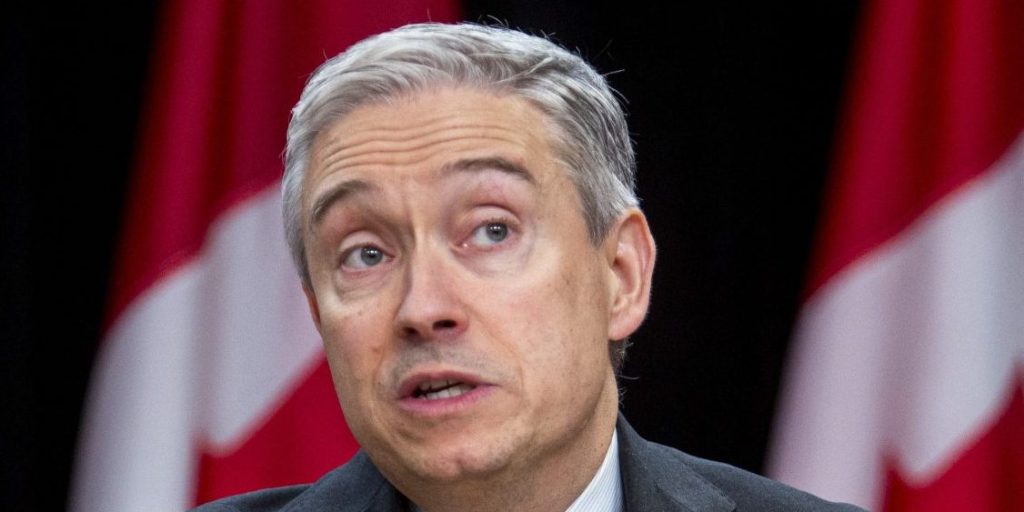
The coverage rules were last reviewed in 2014, but the $100,000 set in 2005 was left unchanged. Between 2005 and 2024, as per a Finance Canada analysis, the number of uninsured eligible deposits have increased by a staggering 594 per cent, however, from $315-billion to $2,183-billion. The insured deposits too rose from $438-billion to $1,241-billion in the same period.
The feds have launched a consultation to gather views on their plans to increase this limit to $150,000 for individuals, and up to $500,000 for non-retail users. The current rules do not provide a separate limit for the two, and the new rules will make this distinction to better cover companies, trusts and other organizations.
The review is precautionary, the feds have clarified, and there have been no claims under this insurance scheme in almost 30 years. It was first mentioned in Budget 2024, so the review has been in the pipeline for about a year.
The increased limit would however mean that the member institutions will have to shell out more in premium and that could hike the costs of maintaining the accounts for depositors. More details on the consultation are available here.
The upgrade in coverage is particularly relevant now, as the U.S. President DONALD TRUMP has expressed desire to tear down some of the financial guardrails in the country that may expose banks to more risks. With the possibility of tariff-induced inflation in the U.S., this could echo the financial crisis of 2008 that had a ripple effect around the world. Politico has written about it here.
We asked, you answered
Hindy wins copy of The Price of Gold: Mining, Pollution, and Resistance in Yellowknife
Congratulations to CHRIS HINDY who wins a copy of The Price of Gold: Mining, Pollution, and Resistance in Yellowknife, by JOHN SANDLOS and ARN KEELING, and published by McGill-Queen’s University Press.
Hindy’s name was drawn after correctly responding that the Giant Mine in Yellowknife, N.W.T., was closed in 2004 due to environment and safety concerns. Shout-outs to everyone else who answered correctly: MAXIME MESSIER, RON COLUCCI, JANICE HAMILTON, JEREMY COSSETTE, ENIKO GALGOCZI, and DAPHNE DUMAS.
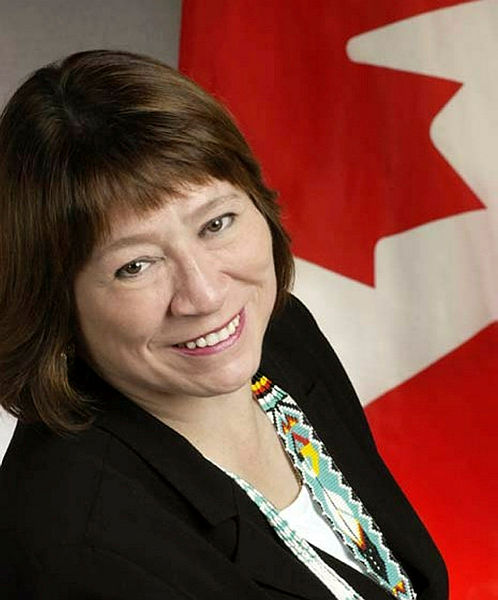
Congratulations to DIEGO AGUILAR, who was the first to correctly respond that Liberal MP ETHEL BLONDIN-ANDREW was the first Indigenous woman elected in the House of Commons in 1988. Blondin-Andrew, who represented the Western Arctic from 1988 until she was defeated in 2006, served as a secretary of state and minister of state. She was made an officer of the Order of Canada in 2022. Kudos to all other participants who answered correctly: PATRICK VERRET, RON COLUCCI, TODD GILLARD, GINA WILSON, ISABEL METCALFE, and MAX FINEDAY.
POLITICAL TRIVIA QUESTION
Which MP said this about the National Gallery of Canada’s acquisition of BARNETT NEWMAN’s $1.8-million painting, Voice of Fire?
“It looks like two cans of pain and two rollers and about 10 minutes would do the trick.”
Please send your answers to trivia@hilltimes.com by NOON ET today, and the winner’s name will be in tomorrow’s Politics This Morning along with the names of all participants. Please include your last name, too.
The Hill Times
